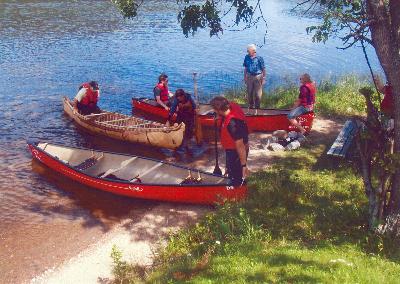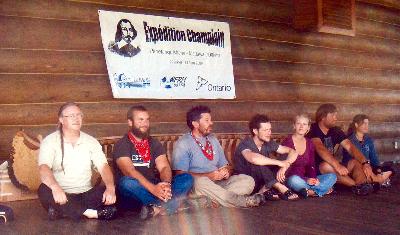 |
August 21, 2009Paddling Your Own Canoe 2009
|
Last week I wrote about Mattawa’s Roger Labelle who makes
beautiful birch bark canoes. I mentioned that I would write about his son
Marcel and his return to his native roots. Marcel’s father is French and
Algonquin and his mother French and Iroquois. Roger’s father’s family made
canoes in the past. Roger was a businessman and fur harvester and began to make
canoes later in life.
 |
Marcel Labelle and Samuel de Champlain canoe
Excursion member in Marcel’s canoe arriving on Explorers Point Mattawa Aug.
7 |
Marcel grew up on the trap line north of Mattawa during the harvest season
and at the Fur Harvesters in North Bay in the late 1980s. I spent a fascinating
day on his trap line with him 20 years ago. When the anti-fur campaign hit, his
business collapsed and he struggled to survive. He attended Nipissing
University and graduated with a degree in Environmental Studies. He took
related work and moved with his wife Joanne and their 2 children to Arthur
Ontario where he had a good job. They opened a flower shop as well. The kids
grew up and got married and Marcel felt he was “dying.”
 |
Samuel de Champlain canoe Excursion members, plus
Marcel Labelle (left) in front of Marcel’s canoe at Mattawa Museum.
|
He began to go back to his native roots and went
on a Vision Quest trip with a friend. He quit his job and began making birch
bark canoes and became an advocate for the native way of life. His sincerity
and commitment paid off and he was soon speaking in schools, selling his canoes
and making a go of it.
By 2009 he had as much work as he can handle. His canoes take upwards of 600
hours to build which fills his time when he is not busy on his other work. The
quality of his canoe work won him the highest Ontario Arts Council Aboriginal
Grant given recently and he is in demand in schools and elsewhere.
He is currently making the parts for hundreds of small birch bark canoes he will
use in his visits to schools to show children how they are made and to talk
about the native way of life. Last weekend he was at the pond at Harbourfront
in Toronto putting on a morning and afternoon presentation. He is at Trent
University for 10 days now as a teacher in an intensive 10 day overbooked summer
course that examines indigenous knowledge from a holistic “on-the-earth”
perspective.He works regularly on a canoe project in Kitchener
He was asked to visit the parliament buildings recently where he proposed
building a canoe on the parliament grounds and it is being considered. He had
the honour of attending the 95th birthday party for William Commanda the famous
Elder and canoe builder from Maniwaki Quebec at the Museum of Civilization.
Marcel has his own website
www.birchbarkcanoes.ca where you can see articles on him, his school and
other schedules and information on canoe building etc. He goes by his native
name Mahigan (Wolf) which Elders gave him. He can be contacted at
mahi_gan@hotmail.com
French Canadian Canoe Excursion
The Ontario Ministry of Culture sponsored a 400km Samuel de Champlain canoe
excursion from Huronia on the shores of Georgian Bay to Mattawa in late July.
When I heard about their arrival in Mattawa August 7th I arranged for them to
visit Roger Labelle and see the birchbark canoe he was completing that I wrote
about last week.
 |
Some Excursion members chatting with Roger
Labelle about his canoe at his home in Mattawa. |
Coincidentally son Marcel and his wife (along with their
birch bark canoe) were visiting Marcel’s dad and mom and were camping on
Mattawa Island near his parents home. Again, coincidentally, the 6 members
canoe brigade decided to camp there overnight prior to a Mattawa arrival party
at the Mattawa Museum on Explorer’s Point the next day.
Marcel met the group and since they had abandoned their birch bark canoes for
more modern ones asked him to join them in a gesture reminiscent of the past, in
their entrance to the Point. One of the brigade members joined Marcel in his
canoe and participated in the celebration. Marcel’s dad was there for the
celebration with speeches and food put on by the Museum. The group went to see
Roger’s canoe in progress later, asking questions, taking pictures and ending an
experience of a lifetime for 6 young French Canadian men and women.
Heritage Perspective Home Page
| 
![]() Past
Forward is now on Facebook "LIKE" us to keep in touch
Past
Forward is now on Facebook "LIKE" us to keep in touch